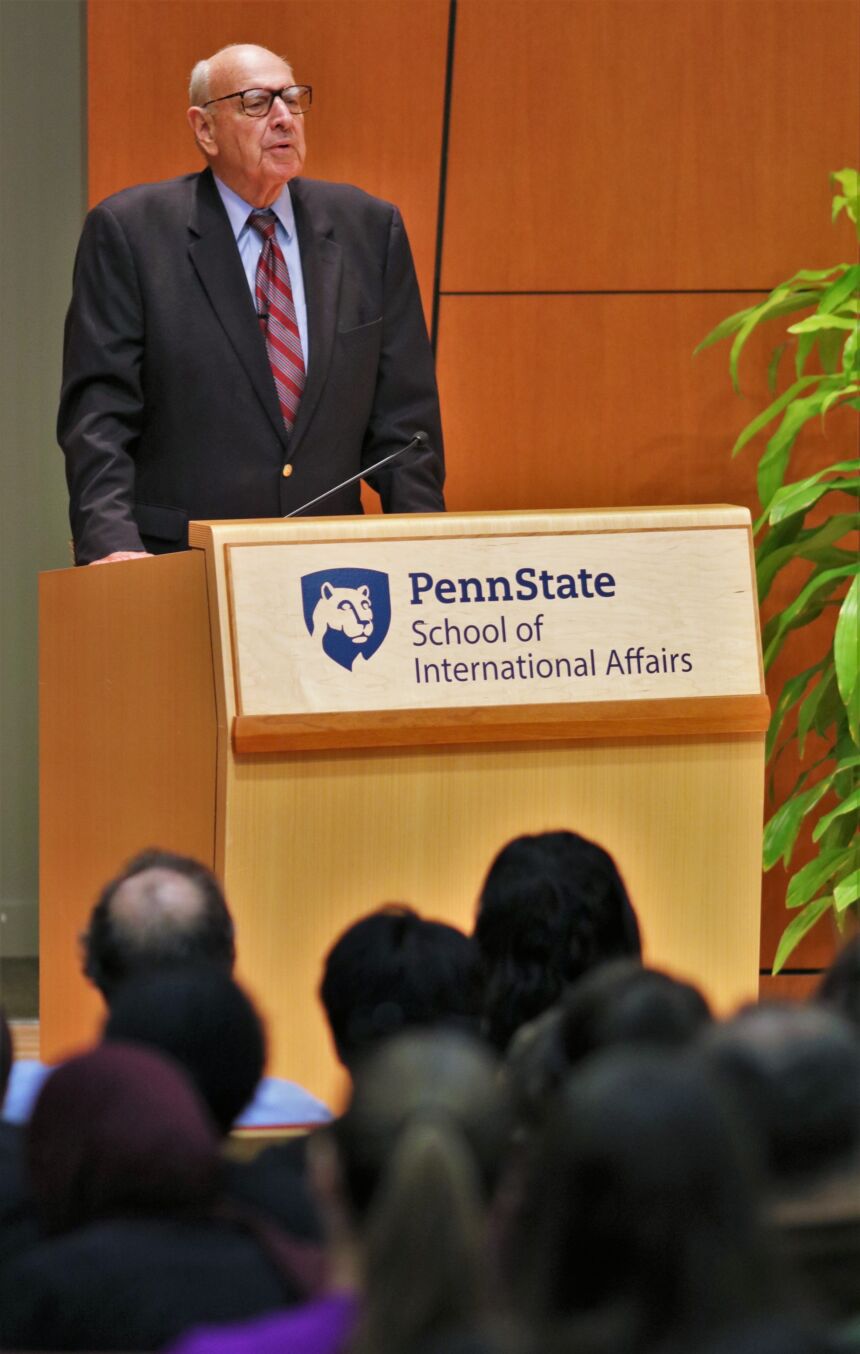October 18, 2017
SIA students work with decorated diplomat in Army War College simulation

UNIVERSITY PARK, Pa. -- Over the course of two days of intense negotiation, the Penn State School of International Affairs became the site of an international summit over the Nagorno-Karabakh region in the South Caucasus.
As part of the school’s annual International Strategic Crisis Negotiation Exercise with the U.S. Army War College, SIA students got an inside look at the complex machinations of international diplomacy through the lens of the long-running territorial disputes of the Nagorno-Karabakh region.
Led by former U.S. Ambassador Thomas Pickering, one of the most distinguished American diplomats in recent history, students represented various regional and global powers in an attempt to resolve the conflicts and tensions simmering in the Caucasus over Nagorno-Karabakh’s demands for statehood and international recognition.
“This kind of exercise gives students a sense of how diplomacy unfolds in the real world by tying their academic experience to real-world issues and negotiations,” said Pickering, who portrayed a special representative of the U.N. secretary general while guiding the negotiations. “The students performed their roles very well and demonstrated an understanding of this complex scenario.”

All of SIA's first year students particpated in the simulation, and took over the Lewis Katz Building as the site of their diplomatic summit.
Although students representing each country expressed goodwill and a willingness to negotiate in their opening statements, it wasn’t long before the hard realities of geopolitics set in. Nagorno-Karabakh may act semi-autonomously but international law recognizes the region as part of Azerbaijan, whose representatives staunchly opposed losing this territory. Representatives of neighboring Armenia supported Nagorno-Karabakh’s right to self-determination, but found themselves maligned by larger nations over the course of negotiations. Competing goals and interests from the representatives of Iran, Turkey, Russia, and the United States only served to further complicate matters.
SIA student Tony Hudson, a Rangel Fellowship recipient who plans to pursue a career in the U.S. Foreign Service, represented the United States and said participating in the simulation was “an eye-opening experience.”
“Negotiations take on a life of their own, but you realize that you’re not just dealing with the recognition of a state—you’re dealing with the lives of its people, their history, and their future,” Hudson said. “This is a great exercise for preparing for what I want to do in the future: Listening to other parties’ interests, keeping my emotions in check, even something as simple as calming myself before addressing a group are all valuable skills during negotiations.”
Hudson praised Pickering’s leadership, noting his immense stature in the diplomatic community and calling it “a great honor” to learn negotiation techniques from such a respected figure in the field of international affairs. Over four decades in the foreign service, Pickering served as ambassador to Russia, India, the United Nations, Israel, El Salvador, Nigeria, and Jordan. In addition to leading the Army War College simulation, Pickering delivered a standing-room-only public address on the United States’ relations with Russia in the age of Putin at the School of International Affairs.

SIA student Tony Hudson, who plans on a career in the U.S. Foreign Service, talks to Ambassador Pickering.
Pickering’s visit to campus also coincides with SIA’s new policy to supplement financial support provided by the State Department fellowship named in his honor, as well as other prestigious fellowships for students of international affairs.
Fellow SIA student Shirin Bouzari, who represented the nation of Azerbaijan in simulation, said each nation had their own unique red lines and non-negotiable positions that the representatives had to work around— “which gives you a glimpse of the difficulties of diplomacy in the real world; you don’t always get what you want.” Bouzari, whose studies focus on human rights and humanitarian response, said having this inside look at how international diplomacy unfolds will be valuable in understanding how the international community responds to humanitarian crises in the kind of work she wants to do after graduation.
Although the students were not able to come to an agreement over the future of the Nagorno-Karabakh region over the course of their diplomatic summit, Col. William Jones of the U.S. Army War College said this reflects the reality of diplomatic negations and that “the objective of this simulation is to experience the process of diplomacy, not to achieve a solution.”
“The failure to solve these intractable problems does not discount the value of this experience,” said Dean Hari Osofsky while addressing the students during the closing plenary session of the simulation. “You are the next generation who will be working to solve these problems.”

A number second-year students, seen here with Ambassador Pickering (center) and Professor and former U.S. Ambassdor Dennis Jett (center left), joined the first year students tio serve as mentors during the simulation.
